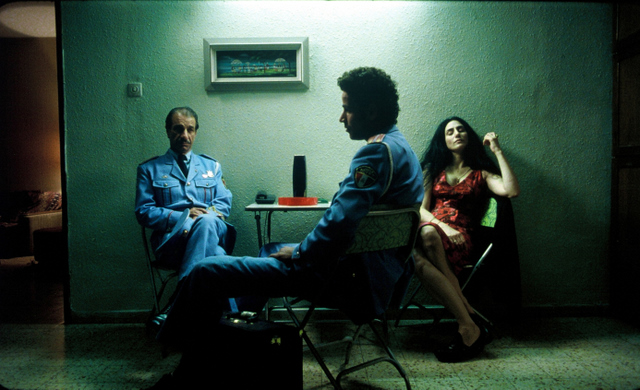FEBRUARY 29, 2008
Good Will Touring
By Mark Jenkins
The Band's Visit
Directed by Eran Kolirin

Alone Together: Gabai, Bakri, and Elkabetz visit. (Sony Classics)
IN ONE OF THE CUTER SCENES in Steven Spielberg's Munich, Palestinian and Israeli operatives meet on neutral ground and bond listening to Al Green. A nice moment, but not a persuasive one; if music is a universal language, that doesn't make everyone fluent. A more plausible musical truce is the basis for The Band's Visit, a film in which an Egyptian troupe comes to Israel to perform at an Arab cultural center, gets lost, and ends up in a town where everyone is a little lost.
The incident about to be recounted "was not that important," notes the intro to Israeli writer-director Fran Kolirin's debut feature. Indeed, the movie's near-wordless opening sequence strongly recalls the work of Finnish director Aki Kaurismaki, that poet of unimportant lives. Forlorn but dignified in their baby-blue uniforms, the eight members of the Alexandria Ceremonial Police Orchestra stand outside an Israeli airport, waiting for a ride that never arrives. Finally, solemn band leader Tewfiq (Sasson Gabai) assigns his cockiest underling, violinist and ladykiller Khaled (Saleh Bakri), to locate the bus to their destination. But Khaled doesn't get it quite right, and so the band finds itself in a desert backwater without an Arab cultural center, or much of anything else.
"No culture at all," shrugs earthy Dina (Late Marriage's Ronit Elkabetz), who runs a cafe frequented by the unemployed and under-motivated. Dina becomes the visitors's temporary patron, feeding them and finding them berths for the night. Tewfiq and Khaled will stay with her, while the others are assigned to skeptical locals. Before bedtime, Dina takes Tewfiq to a night club that's basically a cafeteria, while Khaled checks out a roller disco where he tutors a socially awkward new acquaintance (one of the regulars at Dina's cafe) in the arts of seduction. He can explain love "only in Arabic," Khaled says, and the Egyptians and their hosts are conversing in unsure English. (Because of the heavy accents, this dialogue is subtitled.) But Khaled can demonstrate gestures: how to move closer, how to proffer a well-timed handkerchief, how to place a hand on a knee. It's a charming sequence, and a reminder of how close The Band's Visit is to silent cinema.
It turns out that the central Egyptian characters all share a taste for Chet Baker's music; a Baker-styled version of "My Funny Valentine'' is one of Khaled's secret weapons. Yet Dina is more interested in Tewfiq, both for his palpable sadness (eventually explained) and because he represents classical Egyptian music, a fond memory from her childhood. Dina recalls how Israelis used to love Egyptian movie musicals, back before the countries came to be officially at peace but culturally at war. (Egyptian TV, for example, is a fount of anti-Semitism.)
The Band's Visit has many messages to impart, but they're all delivered gently. The film is a plea for peace, of course, and a nudging reminder that Arab and Israeli traditional cultures are closely linked. Kolirin also has smaller lessons for many of his individual characters, most of whom have not quite faced their situations or characters. (Even Dina, a freelance catalyst and small-town force of nature, has settled for less than she deserves.) All this potential self-actualization could have sunk the movie, but the director maintains a rueful tone and modest approach. He doesn't propose that one night in the wrong hamlet could erase years of sorrow or frustration. After all, anyone familiar with the Israeli-Arab quandary knows that recognizing that some behavior is counterproductive is not that same as changing it.